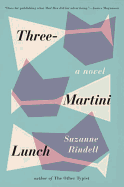
It's 1958, New York City. Cliff Nelson is a Hemingway wannabe who feels destined to be a famous writer, if only his editor father would help him--and if he could get some ideas for great stories. Eden Katz, fresh from Indiana, wants desperately to be an editor, but encounters prejudices because of her gender and surname. Miles is a poor Harlem kid who attended Columbia on a scholarship. He has raw writing talent and gripping stories to tell, but struggles with personal crises that threaten to destroy him. These characters' paths collide in Suzanne Rindell's Three-Martini Lunch.
Rindell (The Other Typist) evocatively captures the city--and the publishing world--as the Beat Generation takes hold. Her descriptions and dialogue have realistic rhythms, and readers can almost hear jazz playing in the background. The distinctively voiced narrators are engaging, although Cliff becomes barely tolerable after he starts complaining about his (lack of) career while not doing the work. He enjoys his privileges and yet has the fewest accomplishments to show. But that's Rindell's point: stop whining and earn your success.
Eden is much more interesting, but unfortunately her chapters get shorter and shorter toward the end of the novel, as if her point of view becomes less valuable. Miles's story is heartrending, though that's expected because of the era's intolerance. Three-Martini Lunch is profoundly sad, while perhaps making readers glad society has changed since the 1950s. Or, considering the political and social climate of 2016, maybe the melancholia comes from wondering, has much progress been made? --Elyse Dinh-McCrillis, blogger at Pop Culture Nerd

